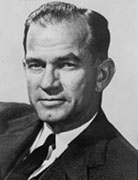William Fulbright

Former U.S. Senator, Arkansas
J. William Fulbright was born on April 9, 1905 in Sumner, Missouri.
He was educated at the University of Arkansas where he was awarded the B.A. degree in Political Science in 1925.
He then attended Oxford University as a Rhodes Scholar where he received an M.A. degree.
When Fulbright returned to the United States, he studied law at George Washington University in Washington, DC. During the 1930's, he served in the Justice Department and was an instructor at the George Washington University Law School. In 1936 he returned to Arkansas where he was a lecturer in law and, from 1939 to 1941, president of the University of Arkansas, at the time the youngest university president in the country.
He entered politics in 1942 and was elected to the U.S. House of Representatives, entering Congress in January 1943 and becoming a member of the Foreign Affairs Committee.
In September of that year the House adopted the Fulbright Resolution supporting an international peace-keeping machinery encouraging United States participation in what became the United Nations, and this brought national attention to Fulbright.In November 1944 he was elected to the U.S. Senate and served there from 1945 through 1974 becoming one of the most influential and best-known members of the Senate.
His legislation establishing the Fulbright Program slipped through the Senate without debate in 1946.
Its first participants went overseas in 1948, funded by war reparations and foreign loan repayments to the United States. This program has had extraordinary impact around the world.
There have been more than 250,000 Fulbright grantees and many of them have made significant contributions within their countries as well as to the overall goal of advancing mutual understanding.
In 1949 Fulbright became a member of the Senate Foreign Relations Committee. From 1959-1974 he served as chairman, the longest serving chairman of that committee in history.
His Senate career was marked by some notable cases of dissent.
In 1954 he was the only Senator to vote against an appropriation for the Permanent Subcommittee on Investigations, which was chaired by Senator Joseph R. McCarthy.
He also lodged serious objections to President Kennedy in advance of the Bay of Pigs invasion in 1961.
He was particularly in the spotlight as a powerful voice in the chaotic times of the war in Vietnam, when he chaired the Senate hearings on United States policy and the conduct of the war.
In 1963 Walter Lippman wrote of Fulbright: "The role he plays in Washington is an indispensable role. There is no one else who is so powerful and also so wise, and if there were any question of removing him from public life, it would be a national calamity."After leaving the Senate, he was of counsel to the Washington law firm of Hogan & Hartson and remained active in support of the international exchange program that bears his name.
He received numerous awards from governments, universities, and educational organizations around the world for his efforts on behalf of education and international understanding. In 1993 he was presented the Presidential Medal of Freedom by President Clinton.
Senator J. William Fulbright died on February 9, 1995 at the age of 89 at his home in Washington, DC.